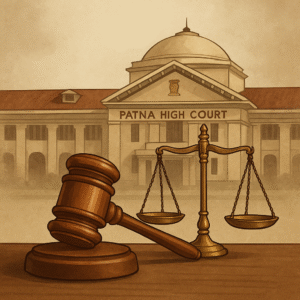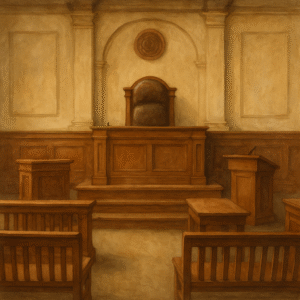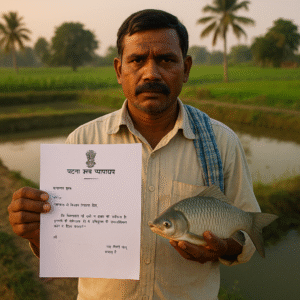Simplified Explanation of the Judgment
The Patna High Court, in a judgment delivered on 9 November 2022, dismissed a civil review petition (Civil Review No. 369 of 2019) filed by a group of daily wage Class-IV employees from Muzaffarpur, who sought a reappraisal of an earlier decision rejecting their claim for regular employment. The Bench comprised Hon’ble the Chief Justice Sanjay Karol and Hon’ble Mr. Justice Ashutosh Kumar.
This review petition arose from a previous decision dated 20 August 2019 in Letters Patent Appeal (LPA) No. 372 of 2018, which had upheld the judgment of a Single Judge in CWJC No. 10679 of 2012. The Single Judge had rejected the petitioners’ claim that they should have been included in the government’s subsequent panels (prepared in 2001 and 2006) for appointment on Class-IV posts, since they were part of the original 1994 panel of daily wagers.
The review petition was thus a last attempt by the petitioners to reopen the case, arguing that certain facts were not adequately considered earlier.
Background of the Case
- The petitioners were engaged as daily-wage workers on Class-IV posts under the Muzaffarpur district administration.
- Following earlier directions of the Patna High Court in separate writ and contempt proceedings, the District Magistrate of Muzaffarpur prepared a panel in 1994 listing eligible daily-wage employees for possible regularization.
- The petitioners’ names appeared in that 1994 panel, but no regular appointments were made from it.
In the year 2000, a Fresh Empanelment Committee reviewed the 1994 list and found it invalid, reasoning that:
- It contained names of only one class of employees (not all categories).
- It listed ten times more candidates than available vacancies.
- Therefore, the list was not in accordance with government rules.
Subsequently, in 2000 and 2001, new lists were prepared, and candidates from different categories were appointed. The petitioners were not included in those later lists.
In 2011, the District Magistrate, Muzaffarpur, formally cancelled the 1994 panel and rejected the petitioners’ demand for inclusion in a fresh list. This led them to file CWJC No. 10679 of 2012, which was dismissed. Their Letters Patent Appeal (LPA No. 372 of 2018) also failed. The current review petition was their third attempt, seeking reconsideration of those findings.
Arguments by the Petitioners
- Earlier Application Ignored:
The petitioners argued that they had indeed applied for inclusion in the panels prepared in 2000, 2001, and 2006, but the authorities ignored their applications. They claimed that this crucial fact was stated in their earlier writ petition but overlooked by the learned Single Judge. - Others from the 1994 Panel Got Jobs Later:
They further contended that several individuals from the same 1994 panel were later appointed in 2011, 2012, and 2017, which showed that the 1994 panel was not entirely invalid. Therefore, the exclusion of the petitioners, they claimed, was arbitrary and discriminatory. - Ground for Review:
The petitioners asserted that since the learned Single Judge and the Division Bench had not properly appreciated this evidence, the matter deserved a fresh review to prevent a miscarriage of justice.
Arguments by the State
Represented by Additional Advocate General (AAG-12) Md. Khurshid Alam, the State government opposed the review, stating:
- The petitioners’ arguments were identical to those already considered and rejected in the earlier appeal.
- The Empanelment Committee’s findings were categorical: the petitioners did not apply in the subsequent years (2000, 2001, 2006), which led to discontinuance of their candidature.
- The new list produced by the petitioners during the appeal was unauthenticated and appeared to have been maintained privately, not officially.
- There was no new evidence or discovery of fact to justify invoking the High Court’s review powers.
Court’s Observations and Reasoning
Justice Ashutosh Kumar, writing for the Bench, made the following key observations:
- Scope of Review is Limited:
The Court reiterated that a review is not a second round of appeal. The power of review is confined to correcting palpable or manifest errors, or where new evidence emerges that could not have been discovered earlier with due diligence. The Court cited two Supreme Court judgments:- Aribam Tuleshwar Sharma v. Aribam Pishak Sharma, (1979) 4 SCC 389
- Shri Ram Sahu (Dead) through Lrs. v. Vinod Kumar Rawat, 2020 SCC Online SC 896
- No New Evidence Produced:
The petitioners failed to bring any authentic or new document proving they had applied in the later years. The list they produced before the appellate court was not verified and was never presented before the Single Judge earlier. - No Justification for Re-Appraisal:
The review petition merely attempted to reopen findings already examined in appeal. The Court noted that the Appellate Bench had scrutinized the record in detail and found the petitioners’ documents unreliable. - Sympathetic Consideration:
Although dismissing the petition, the Bench refrained from imposing costs, noting that the petitioners were Class-IV daily-wage workers.
Significance or Implication of the Judgment
This decision reinforces the limited scope of judicial review in Indian courts. It clarifies that:
- A review petition cannot serve as a second appeal.
- New or previously unconsidered evidence must be both material and genuine to justify reopening a concluded matter.
- Administrative lists or records must be authenticated and verifiable to carry evidentiary value.
For public employees, the case highlights that participation in a panel or list does not create a vested right to appointment. For the administration, the ruling supports the principle that panels can be invalidated if found irregular or overextended.
Legal Issue(s) Decided and the Court’s Reasoning
- Whether the petitioners could seek re-evaluation of their employment claim through review jurisdiction?
→ No. Review is confined to correcting errors apparent on record or considering new evidence unavailable earlier. - Whether the petitioners established that they had applied in later panels (2000, 2001, 2006)?
→ No. There was no authentic document to prove their applications. - Whether alleged appointments from the 1994 list in later years justified reopening the case?
→ No. There was no proof those individuals were similarly situated or that the petitioners were discriminated against.
Judgments Relied Upon or Cited by Court
- Aribam Tuleshwar Sharma v. Aribam Pishak Sharma, (1979) 4 SCC 389.
- Shri Ram Sahu (Dead) through Lrs. v. Vinod Kumar Rawat, 2020 SCC Online SC 896.
Case Title
Prem Nath Paswan & Ors. v. The State of Bihar & Ors.
Case Number
Civil Review No. 369 of 2019 (In LPA No. 372 of 2018).
Citation(s)
2023 (1) PLJR 1
Coram and Names of Judges
Hon’ble the Chief Justice Sanjay Karol
Hon’ble Mr. Justice Ashutosh Kumar.
Names of Advocates and Who They Appeared For
- Mr. Sanjay Kumar Ghosarvey and Mr. Kumar Madhurendu — for the petitioners.
- Mr. Md. Khurshid Alam, AAG-12 — for the State.
Link to Judgment
MTEjMzY5IzIwMTkjMSNO-mZb371YwWLc=
If you found this explanation helpful and wish to stay informed about how legal developments may affect your rights in Bihar, you may consider following Samvida Law Associates for more updates.








